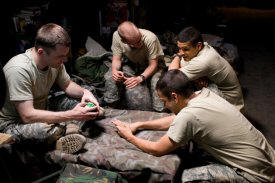 Brian De Palma’s new film Redacted is many things. Raw. Courageous. Disturbing. Brutal. Inflamatory. Bold. Uncompromising. Important. A plea for the soul of our country. Quite possibly the best film of De Palma’s career.
Brian De Palma’s new film Redacted is many things. Raw. Courageous. Disturbing. Brutal. Inflamatory. Bold. Uncompromising. Important. A plea for the soul of our country. Quite possibly the best film of De Palma’s career.
Redacted opens with a statement from De Palma saying that the events of the film are fictional. But the truth is that it was inspired by the actual rape and murder of a teenage Iraqi girl and the killing of her family by a group of four United States Army infantrymen. We are introduced to the four, and other members of their squad, through the video footage being shot by one of the soldiers who hopes to go to film school once he gets home. We are also introduced to De Palma’s storytelling conceit here- the use of video sources from various sources such as a French documentary, news reports from the local media, videos by the Iraqi insurgency posted to YouTube, etc. Redacted may sound like it uses the same technique as other “found footage” mockumentaries, but it is so much more here. De Palma uses the various video sources as not just a narrative device, but as a way to comment on the impact of the current climate of ever-present media effects the soldiers as well as those of us on the home front. It is a complex intertwining of text and subtext that works incredibly effectively.
Using these various points of view, De Palma paints a portrait of these soldiers as they go through their tour of duty, manning a checkpoint in Iraq. The days past slowly, the heat beating down on them as they wonder if the next car to pass through their checkpoint is going to be an attack from insurgents or not. As their tour of duty gets extended, their stress levels mount closer to the breaking point.
There are bound to be those whose knee-jerk reaction to Redacted will be to dismiss as “against the troops.” Such a criticism would be short-sighted, and I would question whether anyone who offers it has actually seen the film. Instead, DePalma is very sympathetic to these soldiers, trying to find answers as to what would drive these soldiers to do what they did and what kind of continued effect the war will have on our soldiers and our nation as a whole.
There’s one shot, almost thrown away, that not only sums up De Palma’s feelings on the war, but on the media’s observing and reporting on it. In the faux French documentary, Salazar is shown on duty at a checkpoint. Suddenly glancing down, something catches his eye. It is a scorpion, being swarmed over by fire ants. The scorpion tries to fight back, but his big stinger is ineffective against the much smaller and more agile ants. Oblivious to the irony, Salazar pulls out his camera and begins filming the smaller enemy swarming over the larger, more powerful opponent.
Perhaps the most damning scene in the film is one that comes towards the end of the movie. One of the soldiers has returned home and is having a homecoming night out with some of his friends at a local bar. After being pressed for a war story, he tells him of the experiences we have just seen him live through, breaking down into tears as he recounts the horror. Oblivious to the emotional pain he is going through, his friends lead the room in a round of applause for the returning war hero. And that is what De Palma is saying about our country. That we have gladly put on the blinders of patriotism to keep from seeing the true horrors of war.
It is incumbent to mention the film’s now well publicized ending in which De Palma presents a montage of photographs of actual Iraqis who have been killed, maimed or wounded during the ongoing conflict. As has been widely reported, the film’s distributor, Magnolia Pictures, has had black bars placed across their faces, obscuring their identities on the basis of protecting themselves from invasion of privacy lawsuits. An ironic punctuation to a film that has attempted to put a human face to this war. But in its own way, it also fittingly reinforces the film’s subtext that questions the effect this conflict has had on our nation’s priorities and moral standing.


